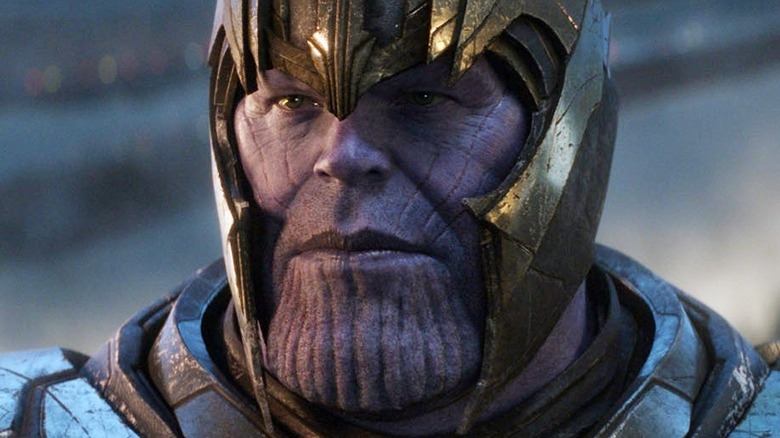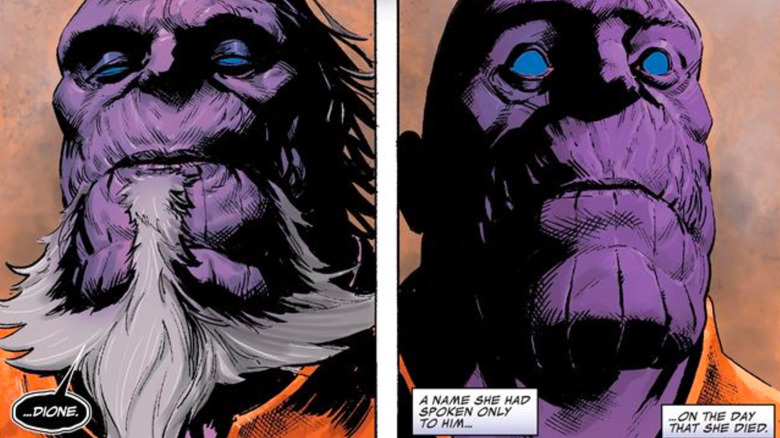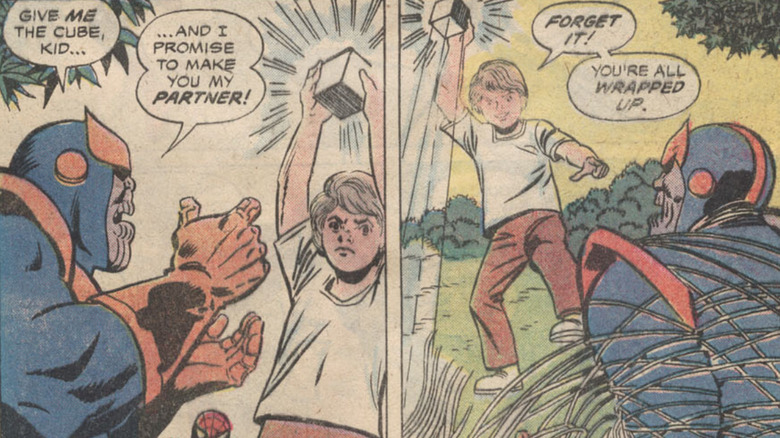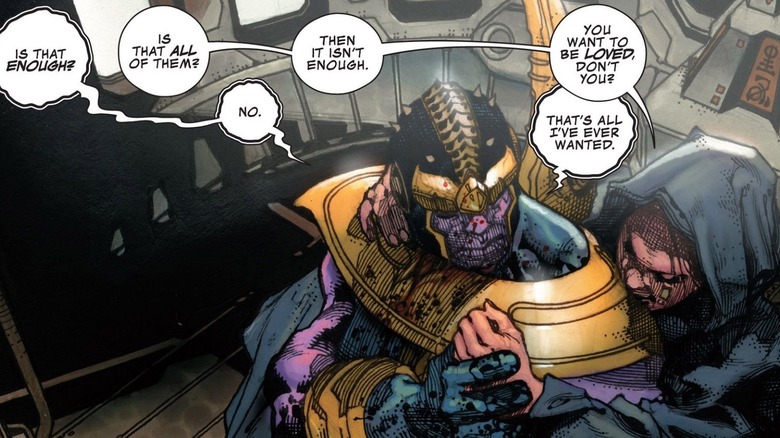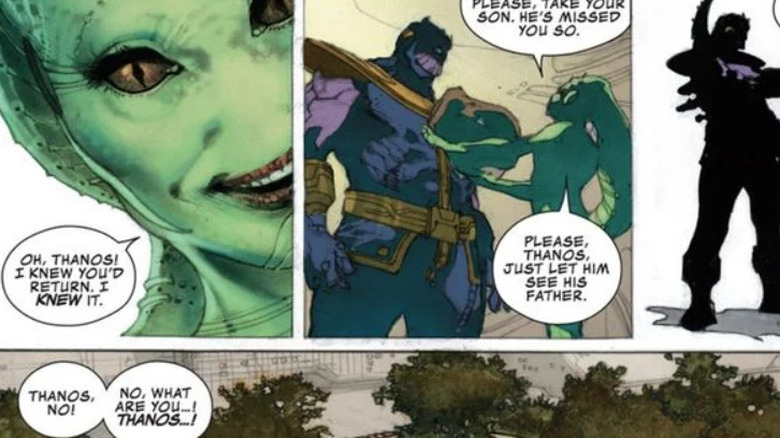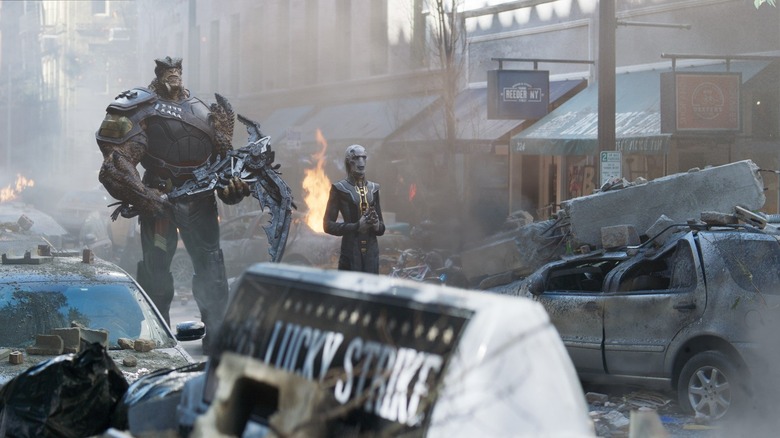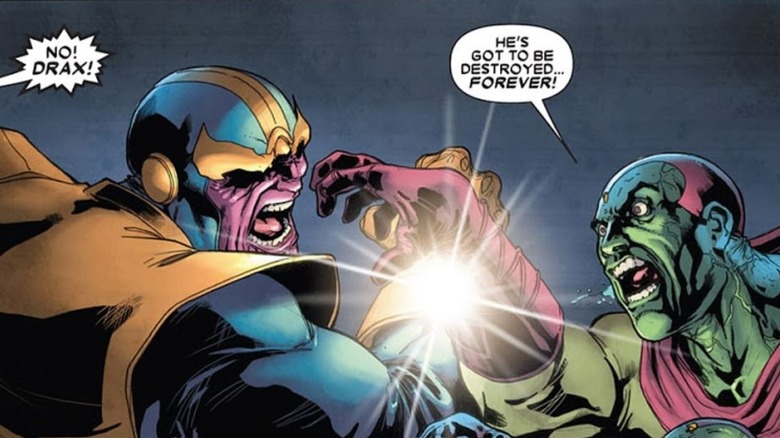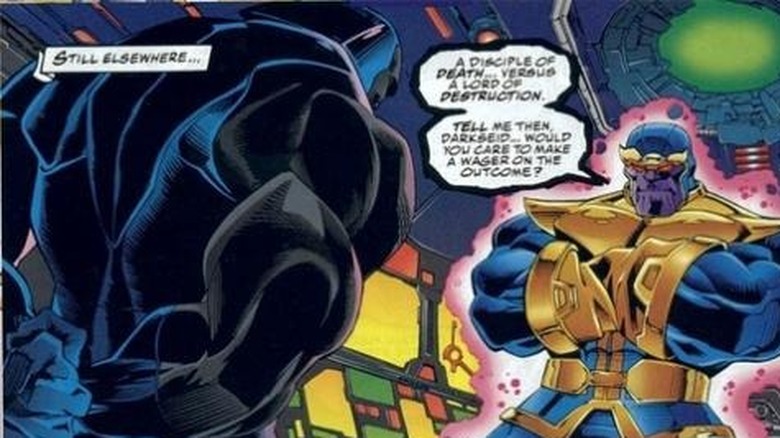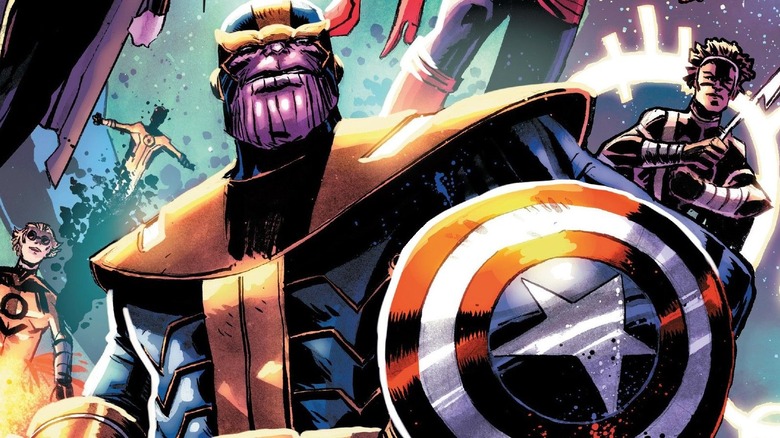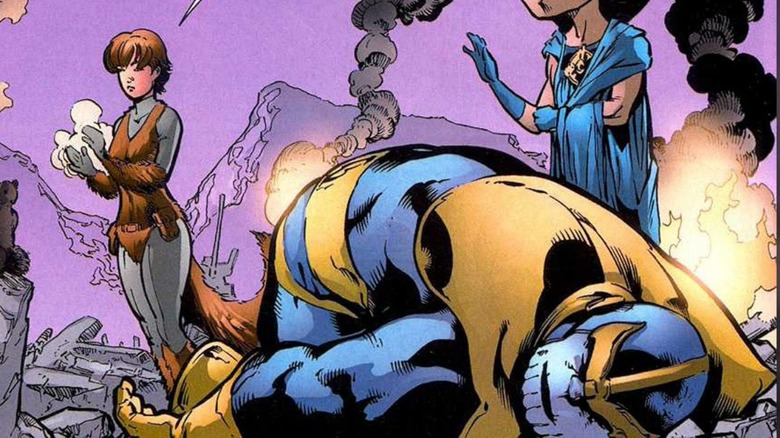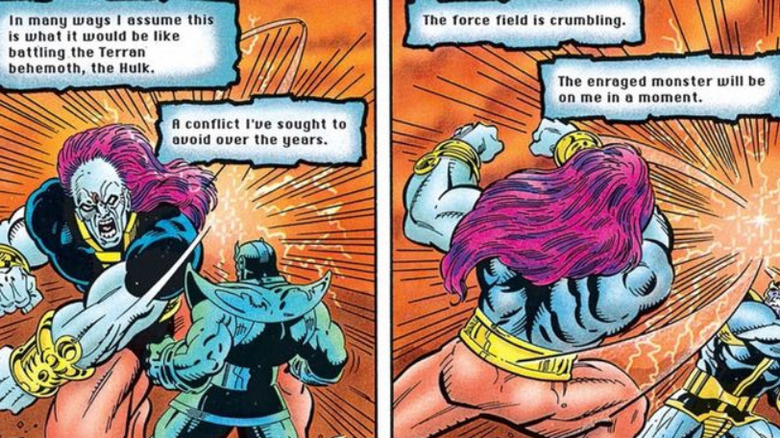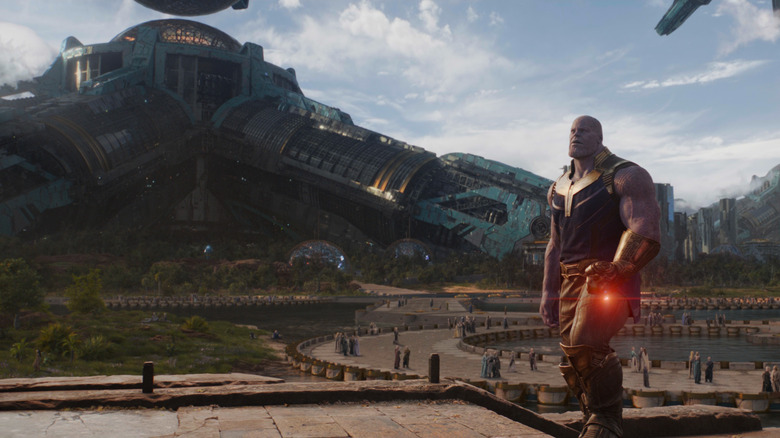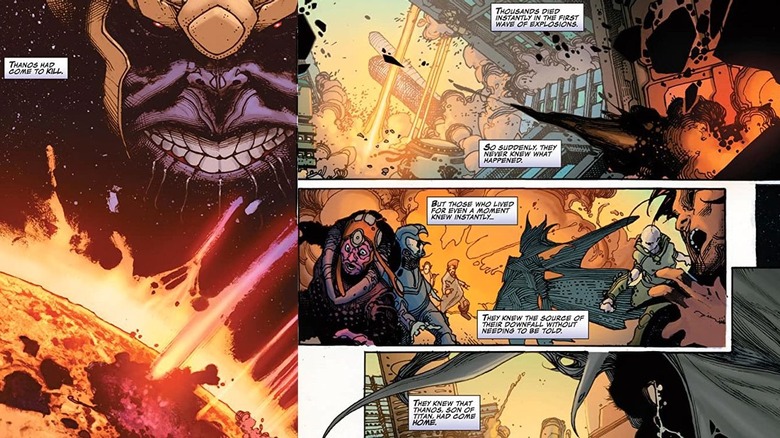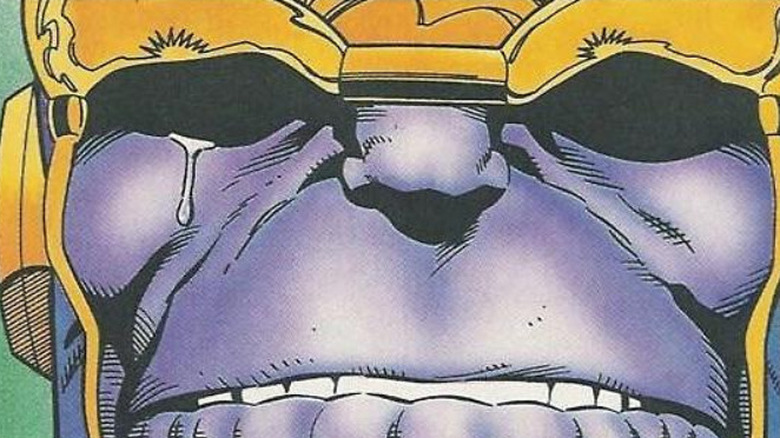False Facts About Thanos You Always Thought Were True
The Marvel Cinematic Universe (MCU) has come a long way from its relatively humble origins. What started with ordinary men doing ordinary stuff like getting a grip on anger issues and escaping from terrorists by building suits of armor has evolved into a multiversal spectacle filled with god-like entities and cosmic stakes.
Perhaps no other character in the MCU better represents its ever-expanding scope than Thanos, played by Josh Brolin. A galactic conqueror belonging to an advanced race, Thanos is obsessed with his plan to rid the universe of half of its population for the ostensible purposes of resource preservation. This quest becomes the reason for Thanos and his army coming into direct conflict with Earth's Avengers.
What makes Thanos such a compelling villain is that his actions are never random. The Mad Titan wholeheartedly believes in his twisted logic and sees himself as a savior rather than a destroyer. However, the Thanos that audiences saw on the big screen is a very different version of the character that appears in Marvel Comics. Here are some major ways the MCU's Thanos differs from his comics counterpart.
Thanos was not always called Thanos
On a superficial but important level, a great villain needs to start with a great name. Darth Vader would not be nearly as scary if his name had been "Doug" instead. On that front, Thanos establishes himself quite well with a name that sounds alien and fearsome when you hear it for the first time.
But just like Darth Vader used to be called "Anakin" and even "Ani" at one point in his life, Thanos did not start out with an awesome and terrifying name. In the comics, the creature the universe would one day come to know as the Mad Titan was born with the name "Dione," given to him by his mother.
That's right. The guy who would someday make the Avengers quake in their boots was born with a name that sounds like it belongs to a barista at a slightly pretentious coffee shop. Fortunately, the mother of "Dione" took one look at his ugly little mug after he was born and realized he looked like a monster and needed an appropriately fearsome name. And so, Dione's mom quickly changed his name to "Thanos," kickstarting his journey towards becoming the supervillain audiences know and love-slash-hate.
He was not always a badass
The MCU has given us some pretty badass entrances, from Iron Man blasting out of the cave in 2008's "Iron Man" to Thor blasting into Wakanda with his new weapon Stormbreaker in 2018's "Avengers: Infinity War." But no entry scene is more badass Thanos' arrival in 2018's "Avengers: Infinity War," in which he effortlessly subdues Loki, makes Thor his captive, and manhandles the Hulk.
That single scene makes it utterly clear that this is one guy who is not only equal to the Avengers, but far above them in terms of strength, intelligence, and resources. And yet, this cool and collected specimen of badassery is not how Thanos has always been depicted in the comics. In fact, he starts out in a much sillier state that can be best summed up with the phrase "Thanos-Copter."
The Mad Titan was created for Marvel Comics in the '70s. When he shows up in 1978's "Spidey Super Stories" #39, due to the importance of branding, he uses a regular-looking helicopter with his name written across it to search for the Cosmic Cube. In the story, Thanos is defeated by a tween skateboarder who attacks him with grass. After this humiliation, Thanos attempts recruit the tween and is rejected. After that, Thanos is hauled off to jail in handcuffs by the police. Thanos doesn't seem so inevitable now, does he?
He does not want to help the world
The biggest trick that the MCU played on fans of Marvel Comics was completely changing the motivation that drives Thanos the Mad Titan. In the movies, Thanos is a type of eco-terrorist who thinks killing off half of all life is the only way to save the rest of civilization from collapsing due to depleted resources.
The plan has a deeply twisted, but theoretically magnanimous logic. Thanos comes across as someone who thinks of himself as saving the universe, even if he wants to do so through horrific means. But the Thanos from the comics has a far more selfish and bizarre motivation. He wants to impress the physical embodiment of Death, with whom he is love, by destroying life on a cosmic scale.
This motivation was actually referenced in the mid-credits' scene of 2012's "The Avengers." When Thanos' servant tells him that "to challenge [humans] is to court death," Thanos turns and smiles, indicating that he likes the idea of courting Death. This motivation was changed by the time "Avengers: Infinity War" came around because the writers felt Thanos' relationship with Death in the comics would prove too complex for general audiences to wrap their heads around.
Thanos had way more children than two
One of the biggest factors that make Thanos in the MCU a debatably sympathetic figure is his apparent love for his daughter Gamora. Even though he ends up killing her to obtain the Soul Stone, it's later made entirely clear that she actually is the most important thing in the world to him and killing her tears him up internally.
In the comics, Thanos has many more children than Nebula and Gamora, and unlike his adopted assassin daughters from the MCU, he sires a lot of them personally. Thane, the secret son of the Mad Titan and an Inhuman, is probably the most well-known of Thanos' numerous offspring. But Thane's secret history pales in comparison to the sordid story of Thanos with the rest of his children, as detailed in the 2013 miniseries "Thanos Rising" by Jason Aaron and artist Simone Bianchi.
The series shows Thanos attempting to turn away from his violent path by becoming a navigator on a pirate ship. In that capacity, Thanos meets and beds women from several planets. Many of these women have children. At first Thanos does not harm any of his intergalactic descendants. But after becoming besotted with Death yet again, Thanos vows to prove his single-minded devotion to her by tracking down every one of his children and their mothers and slaughtering them all.
The Black Order are not his actual children
The MCU has seen its fair share of fearsome extraterrestrial menaces, but none approach the might of the Black Order. Consisting of the diabolical likes of Cull Obsidian, Proxima Midnight, and Corvus Glaive, the Order is led by the wizard-like Ebony Maw. In "Avengers: Infinity War," Ebony Maw makes his destructive intentions clear by declaring, "You are about to die at the hands of the children of Thanos."
This line makes it seem as though Ebony Maw and the rest of the Black Order are Thanos' genetic offspring. But the answer is not so straightforward. Just like Thanos took Gamora and Nebula from their home planets to train them as members of his guard, the Black Order were handpicked by Thanos to be his special disciples.
Think of them as the Death Eaters to Thanos' Lord Voldemort, who pledge fealty to the Mad Titan above all else. But the Black Order is not brainwashed into blindly serving Thanos. At different points in the comics, Ebony Maw betrays the Mad Titan to free Thane, and Corvus Glaive creates his own version of the Black Order to set himself up as the replacement for Thanos.
Drax poses a serious challenge to Thanos
Perhaps no other character in the MCU associated with Thanos got shafted during the transition to live-action as much as Drax the Destroyer. In the first "Guardians of the Galaxy" movie, Drax reveals that Thanos killed his family. As a result, Drax has sworn to exact ruthless vengeance on the Mad Titan.
After that, Drax's vendetta against Thanos is completely sidelined and he never poses any direct threat to Thanos at all. Whereas in the comics, Drax is very much a big deal for the Mad Titan. According to his origin story, Drax was created by Thanos' father to be the one person who could put a stop to his terrible son's universe-scale rampage.
Again and again, Drax fights Thanos and ruins his plans, even managing to personally facilitate the death of Thanos at one point. It is a shame the MCU never fully realized just how big a threat Drax posed to Thanos, something that the onscreen Drax, Dave Bautista, is not stoked about. The famously shirtless actor has gone on record saying he's disappointed by the MCU's very limited amount of interaction between Drax and Thanos.
Thanos is almost not a Darkseid rip-off.
If you are at all interested in the at-times intense rivalry between DC and Marvel Comics, you might know that Thanos, who first appears in "Iron Man" #55, published in 1972, is sometimes dismissed as little more than a poor man's version of frequent Justice League adversary Darkseid, who first appears in "Superman's Pal Jimmy Olsen" #134, published 1970.
The two characters share a lot of similarities, from their massive, sinister physical appearances to their intergalactic origins and ability to take on entire groups of heroes at once and beat them all single-handedly. But Thanos co-creator Jim Starlin was actually aiming to borrow the basic idea behind Metron — an entirely different member of the New Gods family of characters created by Jack Kirby following his 1970 departure from Marvel.
Metron is seen as a cosmic explorer and gatherer of knowledge, and Thanos is also known for his interests in science and exploration. According to an interview with Starlin republished by CBR, he mentioned his intention to create a new version of Metron, and editor Roy Thomas strongly advised him to "Beef [Thanos] up! If you're going to steal one of the New Gods, at least rip off Darkseid, the really good one!"
Thanos is not always the villain
If you were to ask who's the greatest villain the MCU has ever known, chances are the reply is going to be Thanos. The guy is so powerful, so single-minded in his goals, and so completely impervious to most of the attacks by Earth's Mightiest Heroes that it is difficult to imagine him as anything other than the ultimate bad guy.
But the truth is Thanos is far too intelligent to remain firmly rooted in evil after so many adventures and experiences in the comics. On occasion, the Mad Titan works on the side of good and even teams up with heroes in pursuit of a common goal now and again. For instance, at the conclusion of 1991's "The Infinity Gauntlet" when Nebula gains control of the most powerful weapon in creation, the Avengers team up with Thanos to stop her omnipotent crime spree.
During the mid-'90s crossover event "Blood and Thunder," Thor embarks upon a maddened path of destruction. After all the heroes fail to stop his rampage, Thanos is called in to stall Thor long enough for the others to cure the God of Thunder's madness. There's also the time Thanos actually saves Deadpool's life by granting him immortality. Thanos doesn't do this out of a sense of niceness; he's insanely jealous of the fact that Death has fallen in love with Deadpool and wants to prevent them from ever being together.
Thanos has been defeated many times
The first thing "Avengers: Infinity War" lets you know about Thanos is that he is unbeatable. The dude goes head-to-head against not just Loki, not just Thor, not just Hulk, but all three of them at the same time. And he wipes the floor with them so completely that Hulk refuses to come out of Bruce Banner for the rest of the movie.
This trend of Thanos decimating multiple Avengers at the same time continues all the way through until the end of "Avengers: Endgame." If you're principally familiar with the MCU movies and haven't gotten around to reading a ton of comics, you could be forgiven for thinking that Thanos is far and away the most powerful, virtually unbeatable character in the Marvel Universe. But Thanos in the comics has actually been defeated handily many times by much lesser threats than the combined might of all the Avengers.
A tween wielding the Cosmic Cube beats Thanos in "Spidey Super Stories" #39. Thanos is beaten multiple times by his own subconscious due to his inferiority complex over not feeling worthy of the power of the Infinity Gauntlet. And of course, Thanos once lost a one-on-one battle against Squirrel Girl, a hero with the power to talk to squirrels, but that's not so surprising; after all, Squirrel Girl once beat up the entire Marvel Universe. Thanos might be inevitable, but he's definitely not unbeatable.
Thanos is scared of the Hulk
One of the most shocking MCU moments is when Thanos faces the Hulk for the first time in "Avengers: Infinity War." At first, what appears to be the Hulk's advantage is merely Thanos' having fun with the green behemoth before putting him down in a most brutal fashion.
The beating that Thanos delivers to the Hulk is so resounding that the latter doesn't meaningfully appear again until the next movie. Clearly, "Infinity War" does not depict the Hulk as the strongest there is, which is a bit of a departure from how he's traditionally represented. In the comics, Thanos and Hulk have often clashed with varying outcomes. But the Mad Titan has admitted that he is wary of engaging the Hulk in direct combat.
The comics version of Hulk is famously able to grow his strength in proportion to his anger. Thanos knows that while he may be able to match Hulk's power at the start of a fight, he is in danger of losing the longer the fight goes on. Thanos' thoughts on the matter become clear in "The Thanos Quest" #1 when the Mad Titan muses about an opponent, "His strength seems to grow in direct proportion to his anger. In many ways, I assume this is what it would be like battling the Terran behemoth, the Hulk. A conflict I've sought to avoid over the years."
Thanos was born relatively close to Earth
One of the tensest parts of "Avengers: Infinity War" is when Iron Man, Spider-Man, and Doctor Strange decide to commandeer Thanos' ship in order to fly to his home planet and confront the Mad Titan on his own turf to avoid putting Earth in any further danger.
We don't get to see just how far the ship has to fly, but it is implied that it has to travel a great distance to get to Titan, Thanos' home planet. Titan is far enough from Earth that Tony Stark almost doesn't survive the trip home at the start of "Avengers: Endgame" in a spaceship with limited fuel. But in the comics, Titan is in the same solar system as Earth. Thanos isn't technically born on a planet; instead, he's sired on one of the moons of Saturn called "Titan." That particular moon initially serves as the home world of a special species of Eternals called "Titanians."
When Thanos is born among the Titanians, his deformed appearance makes him an outcast among his own people. Thanos' woes are further compounded by the presence of his decisively not deformed and instantly popular brother Eros, aka Starfox. Thus, Thanos chooses to leave Titan and become an intergalactic warlord at an early age.
Thanos destroyed his own planet
The bedrock of Thanos' primary motivation in the MCU occurs on his home planet, Titan. As Thanos explains to Doctor Strange, Titan was a paradise that ultimately succumbed to overpopulation. Thanos tried his best to save his planet and his people, but their society was nevertheless destroyed, leading Thanos to vow to not let overpopulation destroy the other civilizations of the universe.
This backstory makes it clear — or at least allows for the genuine possibility — that Thanos once had a great love for Titan and its people. Nothing could be further from the truth when it comes to Thanos in the comics. The citizens of Titan considered the future Mad Titan a deformed mutant, to the extent that his own mother was convinced she had given birth to evil incarnate and tried to kill him.
The rest of Thanos' peers were just as hostile to him, prompting his departure from Titan. Consumed by dreams of death and destruction, Thanos spends many years honing his mind and body into the most dangerous weapon in the universe. After he grows in experience and gathers vast resources in his travels across the cosmos, Thanos returns to Titan to personally lay waste to his people, including his mother.
Thanos is not always sure of his goals
Perhaps Thanos' most well-defined quality in the MCU — the thing that makes him the most compelling villain and the most formidable foe — is his complete, unwavering belief in his own logic and goals. Once Thanos decides that half of all life needs to be destroyed, there's nothing anyone can say to change his mind.
This overwhelming stubbornness carries Thanos through to killing his beloved daughter Gamora and battling the combined might of the Avengers. But in the comics, Thanos is not always so completely sure of himself. In fact, even in "The Infinity Gauntlet" saga — arguably the definitive Thanos story — the Mad Titan's doubts run so deep that Adam Warlock points out that Thanos lost control of the Infinity Gauntlet three times because he subconsciously willed himself to lose due to the many doubts plaguing his mind.
In the miniseries "Thanos Rising," the Mad Titan grows so remorseful of his actions and the destruction that he causes that he turns away from his conquering goals and became a navigator on a pirate ship instead. Finally, in the comic "The Thanos Quest" #2, after Thanos becomes the owner of the Gauntlet and seeks to finally get together with his beloved Death, she informs him that he is now too powerful to be her mate. This moves Thanos to tears of regret, and he muses that all his efforts have ended in a "hollow victory."
